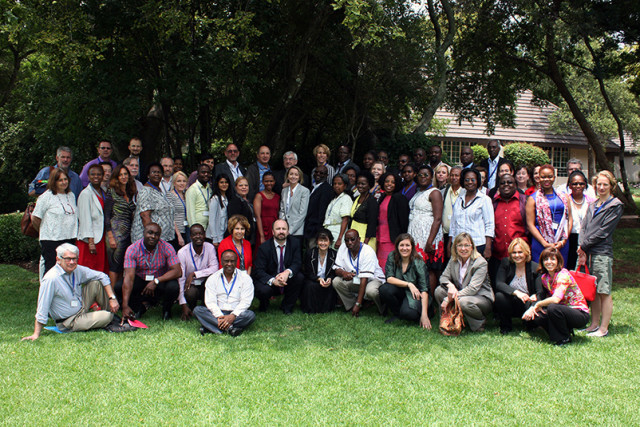From 27th to 29th of January an International Workshop on Neglected Tropical Diseases (NTDs) was held in Johannesburg, South Africa. Experts gathered to share knowledge and discuss solutions to tackle the research on Female Genital Schistosomiasis (FGS) as a risk factor for HIV and as a cause of clinical disease.
FGS is a very common complication of schistosomiasis. The workshop explored how schistosomiasis and in particular FGS may impact on the acquisition of HIV. Participants included medical researchers, gynaecologists, public and private organisations and governments, especially from African countries.
The Director of Communicable Disease Control, National Department of Health South Africa (SA), Ms Tsakani Furumele, gave an overview of the control policies for NTDs and referred to the WHA Resolution 66.12, the London Declaration 2012 and the WHO strategic plan for NTDs in the African region. Schistosomiasis, affecting more than 260 million people increases school absenteeism, causes fatigue, and urogenital problems.
Dr Gita Ramjee from the HIV Prevention Research Unit, SA Medical Research Council/London School of Hygiene and Tropical Medicine, noted that the sexually transmitted infections (STIs) and FGS may have similar impacts on the vaginal mucosa, likely increasing the risk of HIV, affecting the poorest populations, and maintaining gender inequality.
Dr Eyrun Kjetland University of KwaZulu-Natal, SA, Honorary Senior Lecturer / Norwegian Centre for Imported and Tropical Diseases at Oslo University Hospital, listed the few studies exploring the interaction between genital schistosomiasis and HIV. She presented the studies from the last decades, highlighting points that need further research such as mucosal immunology and the effects of anti-schistosomal treatment on HIV and HPV incidence.
Gynaecologist Sibone Mocumbi from Mozambique reported on the progress of the WHO FGS Pocket Atlas. Although 42 million women are likely to have FGS, few health professionals are able to diagnose this. Lesions in the vagina and on the cervix are frequently overlooked, or misdiagnosed as cancer or a sexually transmitted infection. Dr Mocumbi showed the four different FGS clinical findings. He presented the upcoming pocket atlas, a clinical poster and training material for health professionals working in developing countries.
Dr Elisabeth Kleppa presented data on young female children from a study by Hegertun et al. They have similar symptoms to adults – malodorous or bloody discharge, genital ulcers and a burning sensation in the genitals. Dr. Amaya Bustinduy, Liverpool School of Tropical Medicine, presented a study in toddlers of Uganda indicating that praziquantel needs higher doses, especially female children. The praziquantel tablets are bitter and too large to swallow for children and Merck Serono representative Dr. Jutta Reinhard-Rupp and Collen Msimerembwa presented various aspects on praziquantel and the planned childhood formula.
The workshop emphasised the need for further research to determine the role of FGS on HIV incidence, and the implications of such knowledge on the treatment regimens and public health action.
Selected publications 1, 2, 3, 4, 5
- Kjetland EF, Leutscher PD, Ndhlovu PD, 2012. A review of female genital schistosomiasis. Trends in Parasitology 28: 58-65.
- Hegertun IEA, Sulheim Gundersen KM, Kleppa E, Zulu SG, Gundersen SG, Taylor M, Kvalsvig JD, Kjetland EF, 2013. S. haematobium as a common cause of genital morbidity in girls: a cross-sectional study of children in South Africa. PLoS Negl Trop Dis 7: e2104.
- Stothard JR, Stanton MC, Bustinduy AL, Sousa-Figueiredo JC, Van Dam GJ, Betson M, Waterhouse D, Ward S, Allan F, Hassan AA, Al-Helal MA, Memish ZA, Rollinson D, 2014. Diagnostics for schistosomiasis in Africa and Arabia: a review of present options in control and future needs for elimination. Parasitology 141: 1947-61.
- Bustinduy A, King C, Scott J, Appleton S, Sousa-Figueiredo JC, Betson M, Stothard JR, 2014. HIV and schistosomiasis co-infection in African children. Lancet Infect Dis 14: 640-9.
- Stothard JR, Sousa-Figueiredo JC, Betson M, Bustinduy A, Reinhard-Rupp J, 2013. Schistosomiasis in African infants and preschool children: let them now be treated! Trends in parasitology 29: 197-205.

